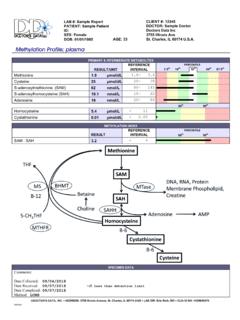Transcription of DNA METHYLATION IN E. COLI: EFFECT ON …
1 DNA METHYLATION IN E. COLI: EFFECT ON RESTRICTION enzymes 1. The problem. Many restriction enzymes are blocked (fully or partially) by METHYLATION . A few enzymes require METHYLATION (such as DpnI) 2. Three METHYLATION systems. Most laboratory strains of E. coli contain three site-specific DNA methylases that can block digestion with restriction enzymes . Avoid designing restriction sites in primers or genes that may become methylated. Problems usually occur due to bases flanking the restriction site. Dam methylase: methylates A in GATC Dcm methylase: methylates C in CCAGG and CCTGG EcoKI methylase: methylates A in AAC(N6)GTGC and AAC(N6)GTGC 3. Sources of information. Information about the sensitivity of restriction enzymes to METHYLATION can be found on the internet, including at The following table from NEB shows information about Dam and Dcm sensitivity.
2 At , you can get specific information about enzymes of interest. This includes information, including EcoKI methylase effects. For example: 4. Cloning strains of E. coli. Most cloning strains are Dam+, Dcm+, EcoKI+ (most are derived from E. coli K12, which lack EcoB1). METHYLATION contributes to post-replication DNA repair, that is why we usually work with E. coli that has methylases. The lab has a Dam-, Dcm- strain (2198) that can be used as needed; strains are also available from NEB (# E4109S, ER2925) and Invitrogen (INV110, derivative of JM110). SURE and XL10 cells are Dam+, Dcm+, EcoKI-minus. Note that some METHYLATION systems are not 100% efficient, so you might get some digestion from regular E. coli. The genotype of DH5-alpha is: F 80lacZ M15 (lacZYA-argF) U169 recA1 endA1 hsdR17 (rK , mK+) phoA supE44 thi-1 gyrA96 relA1; the hsdR17 is in the EcoK restriction enzyme (AACNNNNNNGTGC) but the corresponding methylase gene (hsdM) is present.
3 Those other genotypes are: lacZYA: deletion of lac operon (the U169 mutation) F 80lacZ M15: low-copy plasmid, for making single-stranded DNA with M13 phage, carries lacI and lacZ M15 gene. recA: mutation in gene for protein that stimulates replication. endA: mutation in non-specific endonuclease, resulting in improved plasmid preps gyrA96: resistance to nalidixic acid. relA: uncouples transcription and translation from amino acid levels. 5. What about DNA from a PCR reaction? DNA amplified by PCR is not subject to METHYLATION , and should therefore be digestible, unlike DNA from E. coli. 6. What about cloning methylated DNA into E. coli? There are two systems used to digest cytosine-methylated DNA, the mcrA and mcrB systems. Mammals, higher plants & many prokaryotes contain methylcytosine in their genomic DNA, so their DNA must be cloned into a mcrA-, mcrB- strain.
4 In most cases, you only need to worry about this when going between species, not between E. coli strains.









